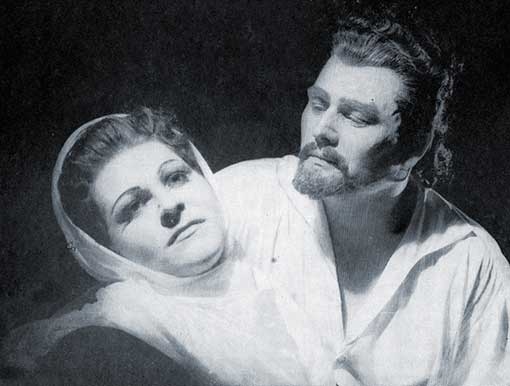I used to listen to Vilém Přibyl in the Janáček Theatre as a kid and he was one of the few singers who stayed in my memory into the future. He stayed in my head despite several years of a teenage break when opera completly left my life. I am not saying that I recognised his extraordinary abilities already as a child but I did not remember him due to an unusual costume or a non-musical event, so there must have been something about him.
It is obviously a strange appreciation for the singer who was at home in Brno as much as in Covent Garden, who sang in performances directed by Georg Solti, and there was interest in him from Bayreuth. I really regret that I have never heard the Mastersingers of Nuremberg – he must have been an amazing Walter von Stolzing – or the Flying Dutchman, where he wonderfully sang the somewhat neglected role of Eric. In Brno, I heard him in Dalibor and I will not try to impress a rational dimension into the childhood memory, I do not need to perfectly understand everything, not even myself.
Vilém Přibyl was born on 10 April 1925 in Náchod, after the war he worked as a designer; he studied singing privately and debuted in Ústi nad Labem in 1959. After two years, he received an engagement in Brno where he lived and worked until his death. In an interview, Richard Novák told me about him: "... He was still more of a Czech tenor, shiny and never-failing. But the volume behind it, which is common among the dramatic Italians, that was not there. We sang together a lot and sometimes he sang the aria of Macduff from Macbeth and he sang it wonderfully. Recordings of four arias by del Monaco were released then on a single, I suspected that Přibyl had listened to it well. We used to argue a lot about these things and I said: "Vilda, do not get angry, but it is by far the best thing you sing. That's how you should sing all the time." And he said: "What's up with you, that you would rip my neck off!" And he always scolded me. He would stand in the wings, listening to someone singing, and tell me: "Please, go to her and tell her not to yell like that." And I said: "Why are you sending me, go to her yourself." "But they already hate me. But you're the guilty one because you sing widely and you somehow do well and they imitate you and they can't. You brought it in here."
A terrific role of Vilém Přibyl was Lohengrin, his lyrical-dramatic performance always suited it perfectly; noble heroes were the singer's most natural domain. He succeeded worldwide with Florestan in Beethoven's Fidelio, the role that I consider to be the touchstone of tenors – the recording is in the archive of Český rozhlas. I appreciate his recording of Dalibor with Jaroslav Krombholc a little more than the legendary recording with Beno Blachut. Přibyl has actually a largely related but slightly firmer expression – it is, of course, a matter of personal taste – the recording is newer, so it has a more modern sound, Krombholc's approach is generally more dramatic and Naděžda Kniplová excels in the role of Milada. You can also learn more about the vocal personality of Přibyl from the recordings of Janáček's operas Osud (Destiny, composer Živný), Její Pastorkyňa (Jenufa, Laca) and Výlety pana Broučka (The Excursions of Mr. Broucek, Mr. Brouček), I would mainly recommend Řecké pašije (The Greek Passion) by Bohuslav Martinů where he played the role of the shepherd Manolio. Vilém Přibyl died on 21 July 1990 – yesterday twenty-four years have passed since his death.































